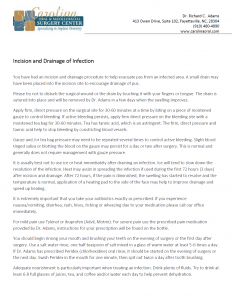incision
You have had an incision and drainage procedure to help evacuate pus from an infected area. A small drain may have been placed into the incision site to encourage drainage of pus.
Please try not to disturb the surgical wound or the drain by touching it with your fingers or tongue. The drain is sutured into place and will be removed by Dr. Adams in a few days when the swelling improves.
Apply firm, direct pressure on the surgical site for 30-60 minutes at a time by biting on a piece of moistened gauze to control bleeding. If active bleeding persists, apply firm direct pressure on the bleeding site with a moistened tea bag for 30-60 minutes. Tea has tannic acid, which is an astringent. The firm, direct pressure and tannic acid help to stop bleeding by constricting blood vessels.
Gauze and /or tea bag pressure may need to be repeated several times to control active bleeding. Slight blood tinged saliva or blotting the blood on the gauze may persist for a day or two after surgery. This is normal and generally does not require management with gauze pressure.
It is usually best not to use ice or heat immediately after draining an infection. Ice will tend to slow down the resolution of the infection. Heat may assist in spreading the infection if used during the first 72 hours (3 days) after incision and drainage. After 72 hours, if the pain is diminished, the swelling has started to resolve and the temperature is normal, application of a heating pad to the side of the face may help to improve drainage and speed up healing.
It is extremely important that you take your antibiotics exactly as prescribed. If you experience nausea/vomiting, diarrhea, rash, hives, itching or wheezing due to your medication please call our office immediately.
For mild pain use Tylenol or ibuprofen (Advil, Motrin). For severe pain use the prescribed pain medication provided by Dr. Adams, instructions for your prescription will be found on the bottle.
You should begin rinsing your mouth and brushing your teeth on the evening of surgery or the first day after surgery. Use a salt water rinse, one half teaspoon of salt mixed in a glass of warm water at least 5-6 times a day. If Dr. Adams has prescribed Peridex (chlorhexidine) oral rinse, it should be started on the evening of surgery or the next day. Swish Peridex in the mouth for one minute, then spit out twice a day after tooth brushing.
Adequate nourishment is particularly important when treating an infection. Drink plenty of fluids. Try to drink at least 6-8 full glasses of juices, tea, and coffee and/or water each day to help prevent dehydration.
Stay on a soft diet until you are feeling well enough to eat solid food. Advance to a regular diet as your pain, swelling and jaw stiffness diminishes.
If your dietary intake is restricted due to pain, swelling or jaw stiffness, supplement your meals with a nutritional supplement like Ensure or Sustical. One can of Ensure three times a day in addition to your meals is recommended. Please see our recommended Food List for more information regarding your diet.
Avoid strenuous exertion until pain and swelling resolves. It is best to avoid lying in bed for a prolonged period of time during the day; this is unhealthy and will only enhance fatigue and slow recovery. Short naps in bed are acceptable if you are tired. Walking, moving about, sitting in a chair are healthier and preferable to staying bed all day. You will feel stronger and better faster if you get your body moving.
It is not unusual to develop a fever due to infection, especially after an incision and drainage procedure. Monitoring body temperature is an objective way to measure progress when treating infections. If you have a fever, we recommend that you monitor and record your temperature at home 4 to 6 times each day, writing down the temperature, time and date. Ideally, this should be accomplished once every four to six hours during the day. It is not necessary to wake up in the middle of the night to check your temperature.
It is important to remember that most pain medications including: Tylenol, Advil, Motrin, ibuprofen, Percocet, and Tylenol with codeine, among others will temporarily bring an elevated temperature down, masking a fever. Always take your temperature at least four and one half hours after taking your pain medication to ensure an accurate reading. Antibiotics do not directly affect body temperature and will not cause false thermometer reading. If you develop a fever of 101 degrees F or higher, please call our office immediately for further instructions.
If you experience swelling under the tongue or into the throat, particularly if it is accompanied by a high fever (101 degrees F or higher) and/or difficulty breathing please call the office immediately.
If you are experiencing any problems or have any questions, please call Dr. Adams at (910) 480-4890. Please try to call during normal business hours if possible; however, we have coverage after 5:00pm weekdays and 24 hours a day on the weekend by calling (910) 480-4890 and pressing option #3.


